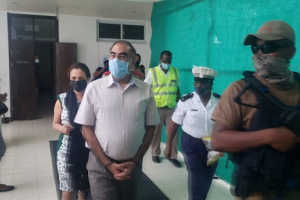Russia and Crimean referendum
(Seychelles News Agency) - The following letter is from Vladimir Belous, Ambassador of the Russian Federation to Seychelles.
Dear Editor,
It is with bitterness and pain that Russians, whose historical roots come from Kiev, Russia, perceive events of the recent months in the Ukraine.
With the active incitement and intervention of a number of foreign states in the internal affairs of the Ukraine in favour of geopolitical interests, there occurred actually an unconstitutional armed coup in which illegitimate forces came to power with the intention of running the country.
Radical nationalists still continue to exert a strong influence through terror and intimidation onto the decisions taken in Kiev.
The interests of Ukrainian regions, the Russian-speaking population, ethnic minorities are being ignored.
Witch-hunting for unwanted politicians is in progress. Kiev has forgotten about the February 21 Agreement signed by President Viktor Yanukovych and opposition leaders in the presence of representatives of France, Germany and Poland on resolving the situation. This situation prompted the legitimate authorities of Crimea (60% of the population are Russians, 20% Ukrainians and 15% Crimean Tatars) to a decision to disengage with Kiev by holding a referendum on the future of the peninsula.
The right to self-determination is enshrined in Article 1 of the UN Charter. It has repeatedly been confirmed by the UN General Assembly resolutions (for example, 1970 Declaration on Principles of International Law, 1960 Declaration on the Granting of Independence to Colonial Countries and Peoples). In a situation where the people do not have an opportunity to gain their status and protect their rights in the framework of the State, in whose territory they reside, such people have the right to self-determination by the removal of that State and/or adherence to another State.
The 1970 Declaration mentioned earlier confirms the inviolability of territorial integrity of states, "observing in the actions the principle of equal rights and self-determination of peoples and, thus possessed of a government representing without distinction of race, religious creed or skin colour the whole people belonging to the territory".
The Vienna Declaration of the UN World Conference on Human Rights also stresses that states claiming to protect its integrity should have "governments representing the interests of the whole people belonging to the territory without distinction of any kind".
For more than its 20-year history of being a part of Ukraine, the Crimean people failed to realise their right to self-determination within the framework of the state because of the policies of the central authorities. In January 1991, a referendum was held in Crimea which resulted in a law of the Ukraine on the restoration of the Crimean Autonomous Soviet Socialist Republic of the Crimea. In September 1991 the Supreme Council adopted the Declaration of State Sovereignty. In 1992 the Constitution of the Crimea was adopted. However, in 1995 the decision of the Verkhovna Rada of the Ukraine (Ukrainian Parliament) and the Ukrainian president, without the consent of the people of Crimea and in violation of the law, the Constitution of Crimea was cancelled. Thus the status of Crimea was changed from an independent state within the Ukraine (according to the Constitution of Crimea of 1992) to a status of an autonomous republic as a territorial unit of the Ukrainian state.
Following the illegal and violent seizure of power in Kiev in February 2014, the situation in terms of the possibility of exercising the rights to self-determination within the framework of the Ukrainian state has deteriorated significantly. Uncertain groups controlled by the authorities in Kiev attempted to overthrow the legitimate authorities of Crimea and organise their criminal prosecution.
The authorities in Kiev do not represent the entire Ukrainian people, especially the population of Crimea, and even do not control a substantial part of the country where local governments take power into their own hands.
Thus the Crimean people left the possibility to exercise their rights to self-determination within the framework of the Ukrainian state; as a result the self-proclaimed Ukrainian leadership has lost the right to defend its territorial integrity.
In this situation authorities of the Ukraine in accordance with 1970 Declaration shall de facto "refrain from any forcible action which deprives people ... of their rights to self-determination, freedom and independence" and not to interfere within the possibility to carry out the will of Crimeans in a peaceful and a free manner. If they have obstacles Crimeans have the right to seek and receive support in accordance with the purposes and principles of the UN Charter.
On Sunday March 16, a referendum was organised and passed in Crimea in a festive atmosphere, with a great deal of activity by residents on the Peninsula. It was attended by 83.1% of registered voters, 96.7% of whom voted for reunification of Crimea with Russia. Voting took place freely in the presence of numerous foreign observers and transparent ballot boxes were used for voting.
The allegations are false that such a turnout was due to pressure from the Russian military representatives who are based in Crimea in the framework of the Bilateral agreement. The number of Russian troops in Crimea does not exceed the Bilateral agreement numbers.
Some countries qualify the referendum as inappropriate in accordance with the Constitution of the Ukraine and rejected its results. But it is irrelevant to the question of its legitimacy under the international law. The practice of realisation of self-determination rights by separation shows that, for objective reasons, it cannot be exercised in accordance with the national legislation.
The US in its memorandum submitted to the International Court in the case of compliance with international law regarding the secession of Kosovo said that "the declaration of independence can and in its nature often inherently violates domestic law ... However this does not mean that there was a violation of the international law".
Besides that the US and a number of other states upheld in the International Court the legitimacy of Kosovo. The International Court itself said that "general international law contains no prohibition applicable to the Declaration of Independence".
Besides that Crimea has more reasons to exercise its right to self-determination through secession than Kosovo. Kosovo was separated from Serbia via military action of a number of states without the approval of the UN Security Council. Kosovo declared its independence in the presence of a legitimate, freely elected government of Serbia. The referendum on independence was not organised on the territory of Kosovo; the Serbian population was deprived of the opportunity to express itself and declare independence from the region. There was not any situation that could have threatened the right to self-determination for Kosovo within Serbia (in the form of autonomy, etc.) at the time of declaration of independence in Kosovo. Russia has preceded from this in the International Court hearings on Kosovo and continues to base its policy towards the Kosovo region.
Leaders of some countries claim that "the people of the Ukraine have their right to choose their future". But this fully applies to the pro-Russian Ukrainians who cannot imagine their existence apart from the fraternal Russian people, Russian language and Russian culture.
When talking about the geopolitical interests of the West and global domination, all other "nuances" in the form of ideology, discrepancy of forms, human rights, appraisals and personal sympathies should be sidelined. The main task is to promote their zones of influence establishing new areas of their cultural civilisation models, domination and unification of all this space on the Western model in terms of American democracy.
The main obstacle to this global task of the West has always been Russia, which firmly stands for the right of people to live in accordance with their traditions, to speak their languages, practice their religion and culture.
Vladimir Belous
Ambassador of the Russian Federation in Seychelles






